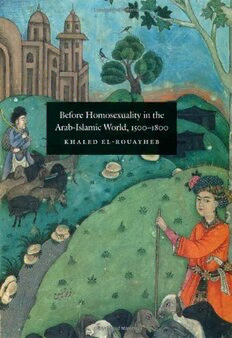
Before Homosexuality in the Arab-Islamic World, 1500-1800 PDF
02005·0.375 MB·English
Most books are stored in the elastic cloud where traffic is expensive. For this reason, we have a limit on daily download.
Preview Before Homosexuality in the Arab-Islamic World, 1500-1800
Description:
Attitudes toward homosexuality in the pre-modern Arab-Islamic world are commonly depicted as schizophrenic—visible and tolerated on one hand, prohibited by Islam on the other. Khaled El-Rouayheb argues that this apparent paradox is based on the anachronistic assumption that homosexuality is a timeless, self-evident fact to which a particular culture reacts with some degree of tolerance or intolerance. Drawing on poetry, biographical literature, medicine, dream interpretation, and Islamic texts, he shows that the culture of the period lacked the concept of homosexuality. “Meticulously researched, lucidly written, nuanced, and brilliantly conceived, [the book] forthrightly takes on complex issues surrounding the culture of same-sex eroticism that existed in the Arabic-speaking lands of the early modern Ottoman Empire. . . . An important book by an excellent scholar.”—Journal of Religion “Rectifies many . . . prejudices and misinterpretations in a masterly fashion.”—Bulletin of the School of Oriental and African Studies (20050617)
See more
The list of books you might like
Most books are stored in the elastic cloud where traffic is expensive. For this reason, we have a limit on daily download.
